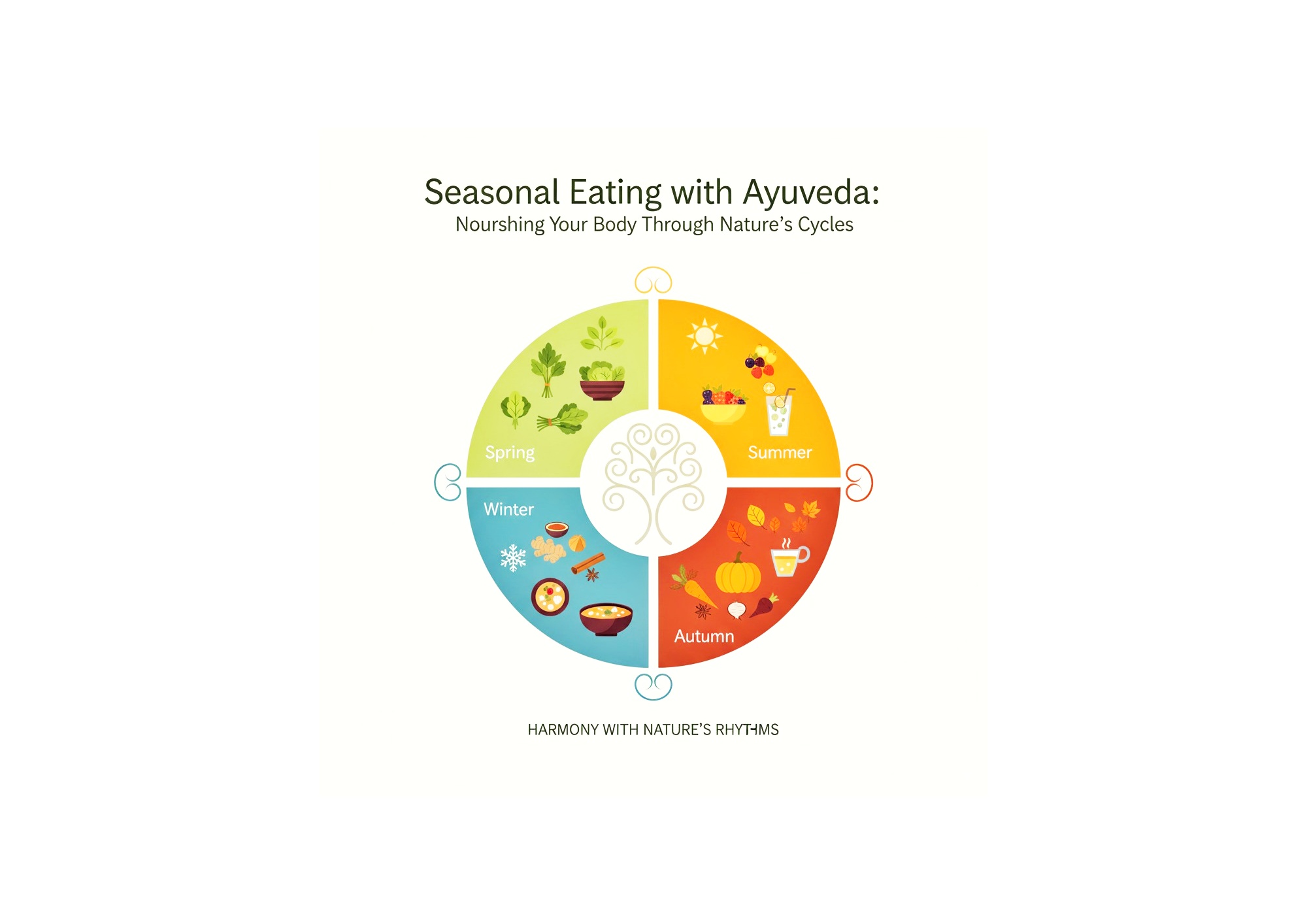Seasonal Eating with Ayurveda: Nourishing Your Body Through Nature's Cycles
Ayurveda teaches us that we are intimately connected to nature's rhythms. Just as the seasons change, so do our bodies' needs. Seasonal eating is a fundamental principle that helps us maintain balance and health throughout the year.
The Philosophy of Seasonal Eating
In Ayurveda, like increases like, and opposites balance. This means we should eat foods that counteract the qualities of each season to maintain equilibrium in our bodies.
Spring Eating (March - May)
Seasonal Qualities
Spring is characterized by:
Heavy, wet, cool qualitiesKapha dosha predominanceNatural detoxification timeRecommended Foods
Favor:
Light, warm, dry foodsBitter, pungent, and astringent tastesFresh leafy greens (spinach, kale, arugula)Sprouts and microgreensAsparagus, artichokes, radishesLighter grains like quinoa and barleyWarming spices: ginger, turmeric, black pepperAvoid:
Heavy, oily, cold foodsExcessive dairy and sweetsProcessed and canned foodsSpring Cleansing
Spring is the ideal time for gentle detoxification:
Start meals with warm water and lemonInclude bitter herbs like dandelionPractice intermittent fastingDrink detoxifying teasSummer Eating (June - August)
Seasonal Qualities
Summer is characterized by:
Hot, sharp, light qualitiesPitta dosha predominanceHigh energy and metabolismRecommended Foods
Favor:
Cool, sweet, and hydrating foodsSweet, bitter, and astringent tastesCucumber, watermelon, coconutFresh herbs: mint, cilantro, basilCooling grains: rice, oatsSweet fruits: melons, grapes, pearsCooling spices: coriander, fennel, cardamomAvoid:
Excessive hot, spicy, and salty foodsAlcohol and caffeine in excessHeavy, fried foodsSummer Hydration
Drink plenty of room temperature waterInclude coconut water and herbal teasEat water-rich fruits and vegetablesAvoid ice-cold drinks which can weaken digestionFall Eating (September - November)
Seasonal Qualities
Fall is characterized by:
Dry, light, cool, rough qualitiesVata dosha predominanceTransition and changeRecommended Foods
Favor:
Warm, moist, grounding foodsSweet, sour, and salty tastesRoot vegetables: sweet potatoes, carrots, beetsWarming grains: rice, wheat, oatsHealthy fats: ghee, sesame oil, nutsWarming spices: cinnamon, ginger, nutmegCooked fruits: apples, pears, figsAvoid:
Raw, cold, and dry foodsExcessive bitter and astringent tastesIrregular meal timesFall Grounding
Establish regular meal timesInclude warm, cooked foodsAdd healthy fats to mealsPractice mindful eatingWinter Eating (December - February)
Seasonal Qualities
Winter is characterized by:
Cold, heavy, wet qualitiesKapha dosha predominanceLower metabolism and energyRecommended Foods
Favor:
Warm, light, dry foodsPungent, bitter, and astringent tastesWarming vegetables: onions, garlic, gingerLighter proteins: legumes, lean meatsWarming spices: cayenne, mustard seeds, clovesHot herbal teas and brothsAvoid:
Cold, heavy, oily foodsExcessive dairy and sweetsOvereatingWinter Warmth
Start meals with warm soup or teaInclude heating spices in cookingEat smaller, more frequent mealsStay active to maintain metabolismGeneral Principles for All Seasons
Mindful Eating Practices
Eat in a calm, peaceful environmentChew food thoroughlyAvoid eating when emotionally upsetExpress gratitude for your foodTiming
Eat your largest meal at middayHave light breakfast and dinnerAllow 3-4 hours between mealsAvoid eating late at nightQuality
Choose fresh, organic, local foods when possiblePrepare meals with love and attentionAvoid processed and packaged foodsInclude all six tastes in your mealsConclusion
Seasonal eating is a simple yet profound way to stay in harmony with nature's rhythms. By adjusting our diet according to the seasons, we support our body's natural ability to maintain balance and health. Start by making small changes and notice how your body responds to eating in tune with the seasons.
Ready to Start Your Ayurvedic Journey?
Book a consultation with our expert practitioners to discover your unique constitution and personalized wellness plan.
Book Consultation
